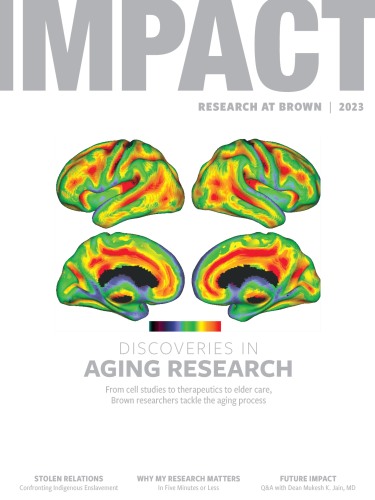Why My Research Matters
Students learn to communicate their research in five-minute TED-style talks.
Students learn to communicate their research in five-minute TED-style talks.
The lights dim, and a hush falls over the crowd. Sarah Christensen, a PhD candidate in the history department, takes her spot center stage on the red carpet. “Once upon a time, there was a princess named Melkorka,” she begins. “She lived in Ireland at the time after St. Patrick had driven away all the snakes but before the English came to conquer.”
This talk was part of the Graduate School's Research Matters event, featuring short, TED-style talks about research by 12 Brown University graduate students on April 21, 2022. View videos of other Research Matters talks on the Graduate School website or watch the entire program on YouTube.
Christensen is presenting at the 2022 Research Matters, an annual event hosted by the Brown University Graduate School during which students from a wide range of disciplines address the prompt “Why My Research Matters.” Melkorka, a character from a 13th-century Icelandic saga, is one of the few documented examples of the countless women sold into slavery in medieval Europe between the 6th and 12th centuries, and hers is just one of the stories Christensen seeks to illuminate in her research.
Although the legal and economic effects of medieval slavery have been widely studied, there has been comparatively little research devoted to the lives of enslaved people, Christensen explained. This is largely due to a lack of sources—the diaries, correspondence, and literature medieval historians often use to study people’s lives rarely include information about the lives of enslaved people. Even fewer sources detail the experiences of enslaved women.
For this reason, most of the documents Christensen has to work with are saints’ lives and fictional narratives. Although these stories often lie at the intersection of reality and religious lore, Christensen argues that they offer valuable insight into the lives of enslaved women.
“I push the boundaries of our approach to medieval emotion by finding meaning in a sparse array of scattered textual and material fragments that offer glimpses into these women’s lives,” Christensen said in her talk. “By reimagining stories like Melkorka’s, I hope to show that enslaved women in early medieval Europe survived and subverted their circumstances and altered their newfound worlds.”
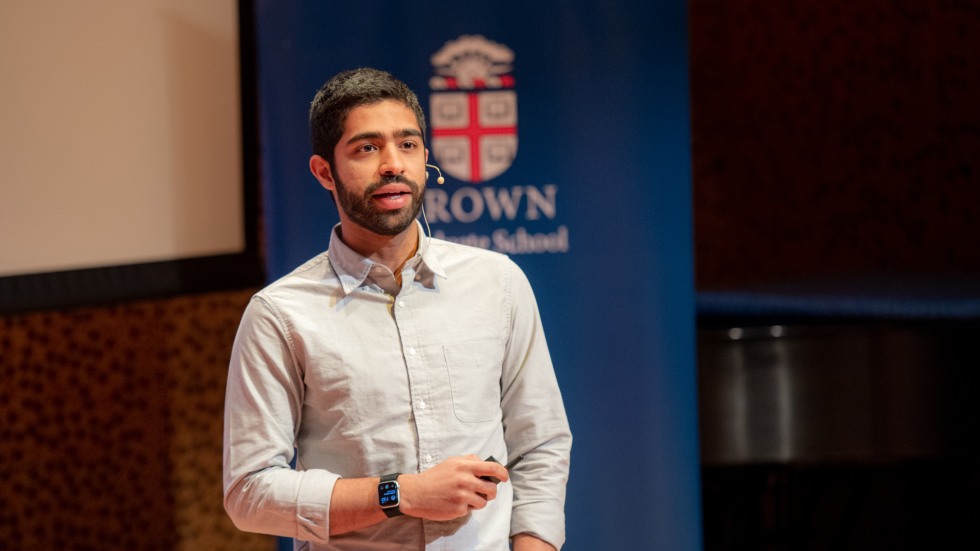
Aarit Ahuja

Baoli Yang
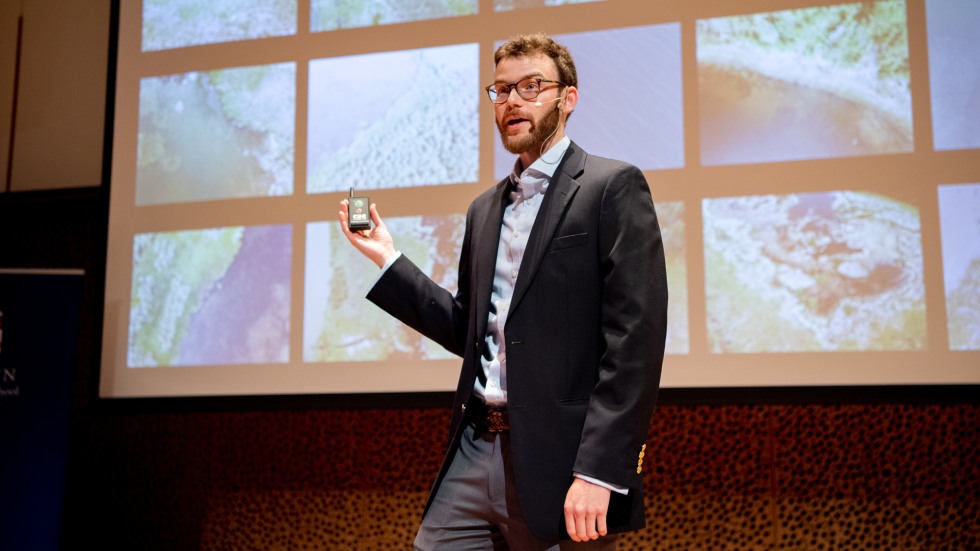
Ethan Kyzivat
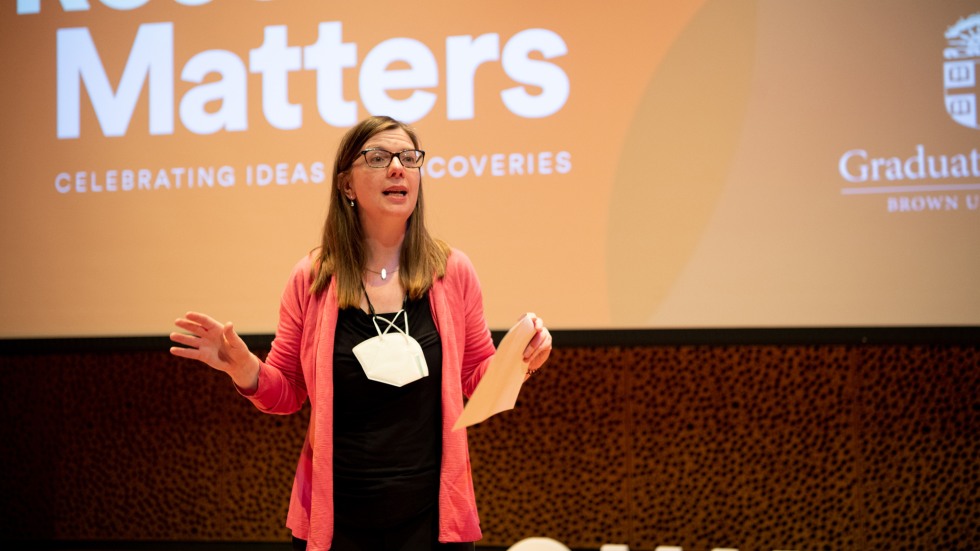
Vanessa Ryan
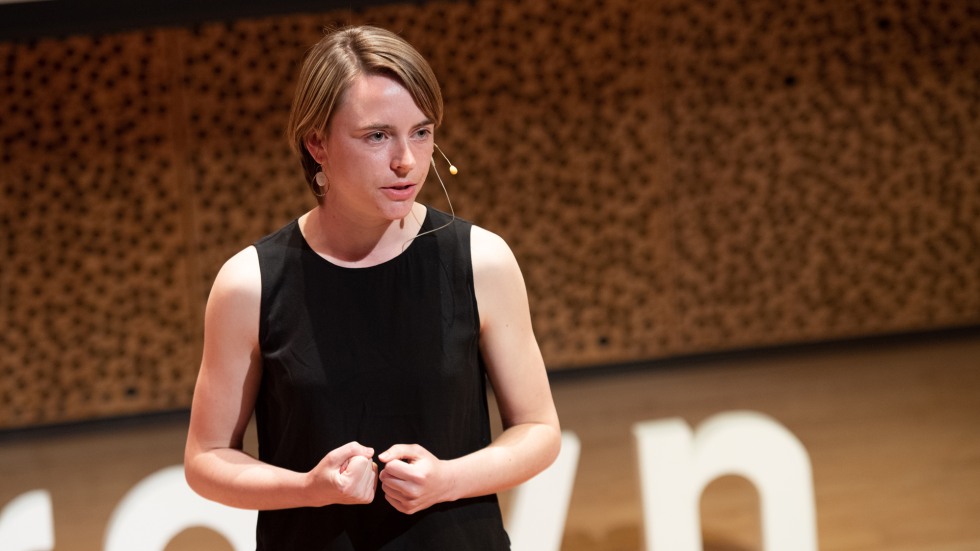
Sarah Christensen
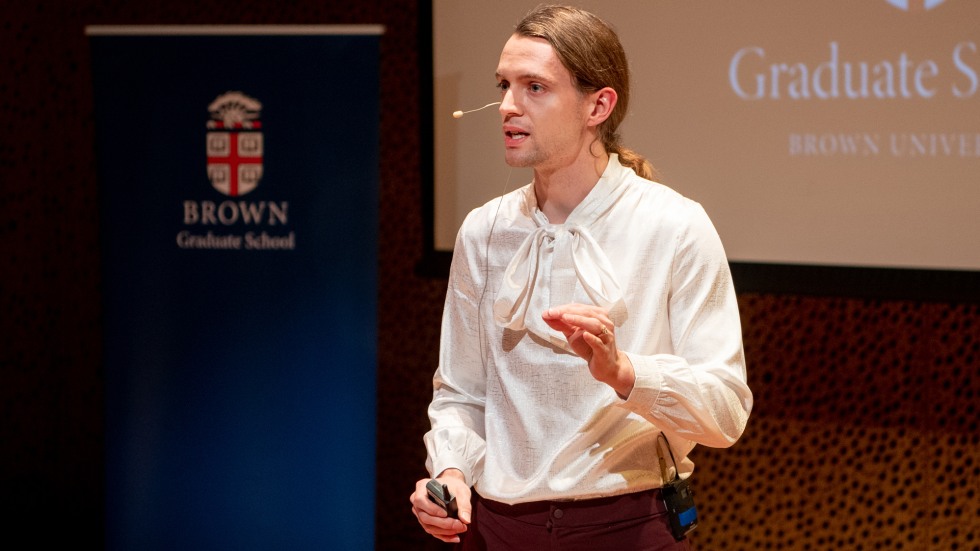
Cooro Harris
A History of Communication
Christensen originally learned about Research Matters from her advisor. She applied to be a speaker at the event for the opportunity to practice her presentation skills while also learning about the research conducted by graduate students from other departments.
“In humanities departments, there isn’t always much focus on preparing grad students for public speaking, even though lecturing and speaking at conferences are a big part of our job,” she said. “I was interested in challenging myself to quickly prepare a talk and perform in front of people without expertise in my field, to prove that I can communicate my work effectively to a broad audience.”
This desire to communicate research effectively lies at the heart of the event, according to Senior Associate Dean of Student Development Vanessa Ryan, who has organized and overseen the event since its start. “We have multiple goals in Research Matters,” she said. “One is that we want to give visibility to graduate students and celebrate their research. And that’s why it’s a live event—it’s fun, and it’s engaging.” Another goal is to give graduate students opportunities for professional development.
These talks are part of the Graduate School's Research Matters event, featuring short, TED-style talks about research by 12 Brown University graduate students on April 21, 2022. View videos of other Research Matters talks on the Graduate School website or watch the entire program on YouTube.
The first Research Matters event was held in 2014 as part of Brown’s 250th anniversary celebrations, Ryan said. By featuring five-minute TED-style talks, the planners hoped to differentiate the event from standard research symposia by engaging specialists and nonspecialists alike. “We ask students to present a talk that will make their advisor say, ‘Yes, you nailed it, you really captured your dissertation!’ but also so that their roommate, sibling, cousin, or someone of the general public can understand,” Ryan said.
Each year, about 20 to 25 Research Matters semifinalists are selected from a competitive pool of nominations. Students can either nominate themselves or be nominated by someone else. Finalists are then chosen on the basis of semifinalist presentations.
“We have a selection committee that includes some past Research Matters presenters, and we’re really looking for great stories with potential,” Ryan said. “We’re also looking for diamonds in the rough—we’re not necessarily looking for the person who's already ready to go on stage. Sometimes we see a great story, a wonderful research topic, and we think that with mentorship, this person is going to give an exceptional talk.”
“ I was interested in challenging myself to quickly prepare a talk and perform in front of people without expertise in my field, to prove that I can communicate my work effectively to a broad audience. ”
From Script to Presentation
After being selected, the finalists go through four weeks of practice presentations and workshops, where they revise their original talk with mentor and peer suggestions.
According to Byrd McDaniel, who presented at the 2019 Research Matters as a graduate student and now works at Brown as assistant director of student development, these workshops are “one of the most meaningful aspects of the process.”
“Having those conversations with peers and giving them advice and feedback about how they can hone their presentation skills definitely allows you to attend to your own delivery as well,” Byrd said. It also fosters a supportive community and encourages students to make interdisciplinary connections and to learn about the pursuit of knowledge in other fields, he added.
Baoli Yang, a PhD candidate in comparative literature, was drawn to Research Matters as a way to convey her research to a broader audience, but “was not sure if my presentation skills, being a nonnative speaker, or my understanding of my research topic was sophisticated enough to participate,” she said. Still, after passing her doctoral qualification exam, she decided to take a chance.
Once accepted, she worked closely with her advisor and Ryan to prepare a script. “Vanessa Ryan provided me with a lot of advice on how to make my presentation better during rehearsals, and the other participants also offered me encouragement and constructive suggestions,” Yang said. “On the event day, I was so nervous that I forgot to pick up the remote control for my slides when mounting the stage. But with all the practice from the rehearsals, I soon collected myself, retrieved the remote, and finished my presentation.”
This talk was part of the Graduate School's Research Matters event, featuring short, TED-style talks about research by 12 Brown University graduate students on April 21, 2022. View videos of other Research Matters talks on the Graduate School website or watch the entire program on YouTube.
Her talk described her research on Sinoscript, a medieval Chinese writing system that spread throughout medieval East Asia as a result of Chinese imperialism. “In institutional literature and historiography, there is a consistent narrative about how China became this cultural superiority, especially in Chinese documents in Korea and Japan, where China installed Chinese political and cultural systems. However, in manuscripts and other newly excavated texts, there are different stories to be told,” Yang said.
By highlighting the ways surrounding cultures engaged with and appropriated Sinoscript, Yang hopes to “revise mainstream history by bringing to light underappreciated voices,” she said. Participating in Research Matters gave her confidence in her ability to share her work and bring awareness of this topic to a wider audience.
“Preparing for the event definitely changed how I communicate my research,” said Aarit Ahuja, a PhD candidate in neuroscience. “One of the hardest things to do as a researcher is to know what to edit out, be it while speaking, writing a paper—whatever the format may be. Because you’re so entangled in the work, all of it feels equally important, and it can be a struggle to keep things concise,” he said.
In his talk, Ahuja discussed his research on mental simulation, or “the ability to form a mental model of the world and play that model forward,” he said.
This talk was part of the Graduate School's Research Matters event, featuring short, TED-style talks about research by 12 Brown University graduate students on April 21, 2022. View videos of other Research Matters talks on the Graduate School website or watch the entire program on YouTube.
To do this, he uses functional magnetic resonance imaging, a technique that allows scientists to visualize what parts of the brain are active. “What we have found so far is that when you are tasked with solving a problem that involves predicting how something is gonna move...your brain responds as if it were actually seeing something move,” Ahuja said. Basically, “this simulation strategy does actually recruit visual circuits.”
“ Graduate students are the engine behind a lot of our research. They’re the hands in the labs doing calculations. They’re in the archives. They’re in the field. They’re all becoming the world’s biggest experts in their fields—that’s what a PhD is. ”
Now Ahuja and his lab want to delve deeper to understand how the visual circuitry informs these simulations on the neural level, which requires experimental techniques that cannot safely be conducted on human subjects. They have been able to replicate their human test trials with primates, and this “opens the door for researchers to dissect this neural phenomenon at a much more granular level,” he said.
“But at the end of the day, why does any of this really matter?” he asked in his talk. To answer this question, he highlighted its direct relevance to our understanding of disorders like posttraumatic stress disorder and schizophrenia, where people experience unwanted, vivid hallucinations.
Voicing Impact
Ethan Kyzivat, a PhD candidate in the Department of Earth, Environmental, and Planetary Sciences, emphasized the way his research will contribute to combating global climate change. Kyzivat and his team are part of a decade-long NASA project dedicated to measuring environmental and human changes in the Arctic, which contains nearly half of the world’s lakes.
“We know that wetlands and lakes are the biggest persistent emitters of methane in the landscape. If we can better quantify how much of the area of the landscape they take up, we can have a better, more nuanced estimate of emissions,” Kyzivat said.
Typically, the amount of methane emitted from each lake is calculated based on the lake’s size. However, “not all water bodies are created equal,” Kyzivat said. “There’s deep ones, shallow ones, vegetated, and non-vegetated, and all those factors influence the amount of methane” each lake emits.
By separating lakes into two bins—ones with vegetation, which only grows in shallow lakes, and ones without—Kyzivat and his team calculated a 21 percent increase in methane emissions compared to nonbinned estimates.
These five talks are part of the Graduate School's Research Matters event, featuring short, TED-style talks about research by 12 Brown University graduate students on April 21, 2022. View videos of other Research Matters talks on the Graduate School website or watch the entire program on YouTube.
“Modern climate models can not only resolve the projected human emissions of greenhouse gasses, but also natural emissions,” he said to conclude his talk. “I hope my research is important in informing the wetland maps to build models that are our best estimate of how climate change will play out in the coming decades.”
Cooro Harris, a PhD student in chemistry, illustrated the relevance of their research on polybenzoxazole, or PBO. They began with posing potential uses for PBO, highlighting the fact that it is twice as strong as Kevlar—a material commonly utilized for its strength in car tires and bulletproof vests—at the same weight. “Why is PBO not everywhere?” Harris asked the audience. “Why aren’t we using this to line our police officers’ bulletproof vests? Or our firefighters’ protective coats?”
Because PBO is so strong, it lacks flexibility, they explained, and cannot be formed into fibers without the use of harsh acids to soften it. In order to “access the strength of PBO without dealing with the strength of PBO,” Harris manipulated PBO precursors using a series of chemical reactions to create pre-PBO, which can mix well in organic solvents without the need for harsh chemicals.
This talk was part of the Graduate School's Research Matters event, featuring short, TED-style talks about research by 12 Brown University graduate students on April 21, 2022. View videos of other Research Matters talks on the Graduate School website or watch the entire program on YouTube.
Now Harris is moving forward with a new NASA-funded project to take this new, soluble pre-PBO and make it into a thin sheet that can be used to coat the uniforms of astronauts and firefighters as well as for other protective purposes.
“Preparing for Research Matters helped me realize that a number of good speaking skills I see in other areas of my life, like stand-up comedies and improv storytelling from Dungeons & Dragons, can be directly transferable skills to scientific presentations,” Harris said. “This kind of cross-lateral thinking with regards to the different aspects of my life helps me be a better researcher because I can apply the lessons I learned elsewhere to my work.”
More Than Just a Presentation: Takeaways
For audience members, this event is an opportunity to learn about the wide range and far-reaching implications of Brown University research and to celebrate the graduate students behind it. “Graduate students are the engine behind a lot of our research,” Ryan said. “They’re the hands in the labs doing calculations. They’re in the archives. They’re in the field. They’re all becoming the world’s biggest experts in their fields—that’s what a PhD is.”
Ultimately, Research Matters is about sharing and communicating research in a way that is exciting. “If you do great research, but it’s hidden, if it’s not communicated, then there’s a loss,” Ryan said. “We want to make sure that students feel empowered and gain the skills needed to take their research and make an impact.”
Immersive Research
Undergraduates develop skills through summer internship and fellowship programs
